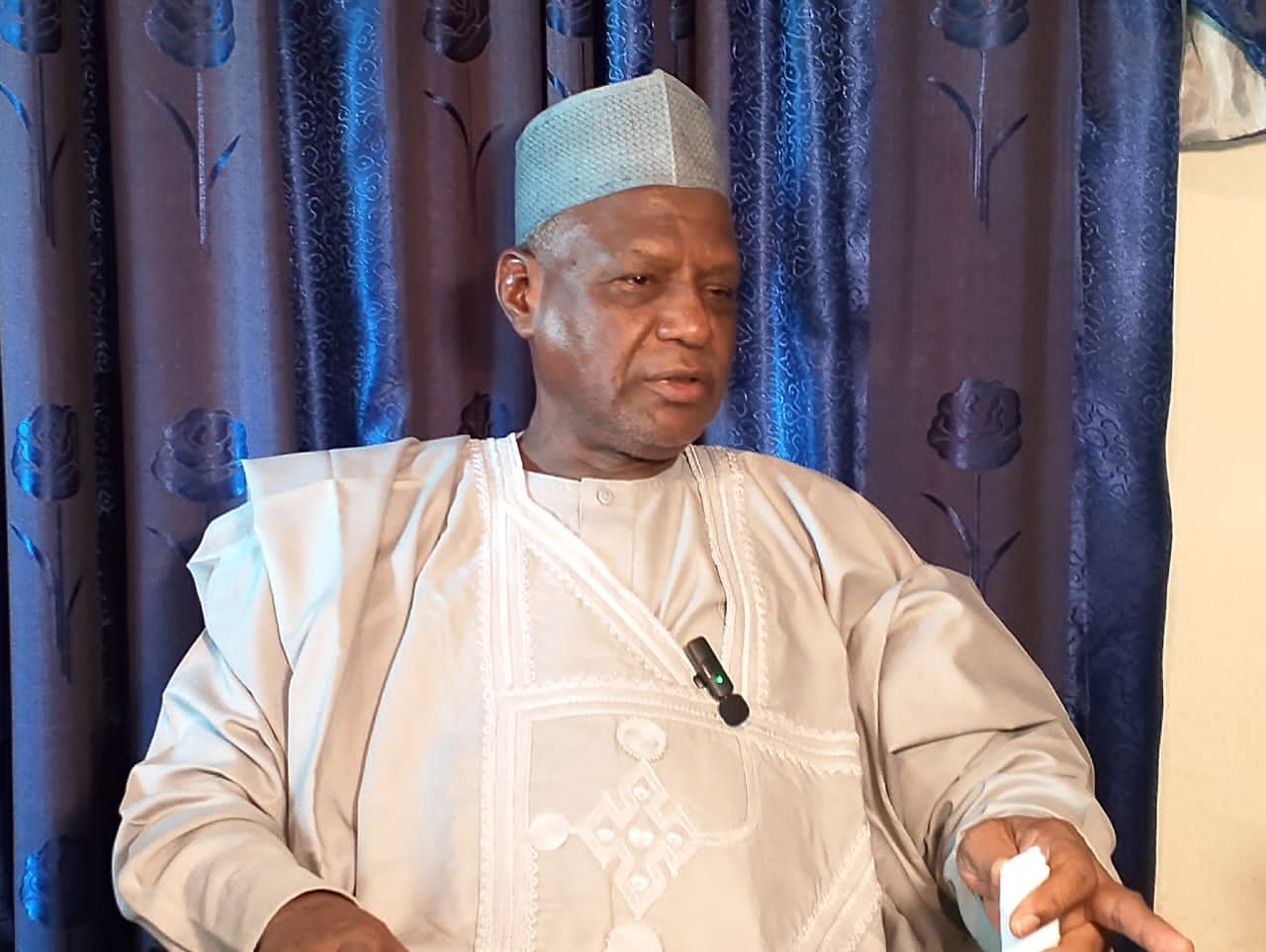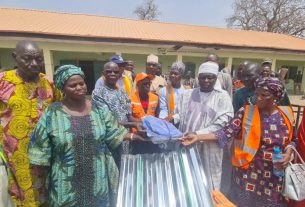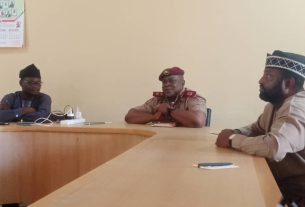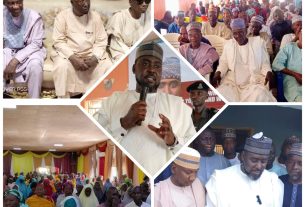In this interview, Senator Abubakar Girei who was in the National Assembly for Adamawa Central Zone between 1999 and 2003, describes Governor Ahmadu Fintiri as an impactful leader who has stamped his feet boldly on many sectors of public life across Adamawa State; and President Bola Tinubu as a listening President who has often addressed issues of public concern.
QUESTION:
The creation of chiefdoms and Emirates by Governor Ahmadu Fintiri caused mixed fealings. What do you make of it?
ANSWER:
I like to take this opportunity to congratulate the newly appointed emirs and chiefs and wish them a successful tenure. I also hope and pray that this marks the beginning of peaceful coexistence in Adamawa State. Since childhood, I have known that people from Hong and Dumne have long agitated for this, and now that God has granted it, I hope they will find happiness and live peacefully with their fellow citizens across the state.
People of other chiefdoms and emirates across the state believe this move will serve as a catalyst for development in their areas. I have no doubt it will lead not only to political but also social and economic advancement in the various places. I commend the governor for taking such a bold step. My brother and former Governor Bala Ngilari once said: ‘I wish I had the guts and the courage to do the things Fintiri is doing. I don’t. It’s rare to find someone with that kind of courage. Thank God he’s here, and he’s done it.’
Though I may not agree with everything he has done, I commend Governor Fintiri’s courage, and I pray it fosters peaceful coexistence throughout the state.
QUESTION:
In some areas, the creation of chiefdoms and emirates has caused discontent. For instance, there’s an ongoing legal tussle in Fufore. What about that?
AMSWER:
That’s normal and natural. There’s no way everyone will be 100% satisfied. Whoever is unhappy has a constitutional right to seek redress, including legal action. As long as it’s done peacefully, I have no issue with it. Let them go through the legal process. Whatever the outcome, we should accept it in good faith. No quarrel at all.
QUESTION:
Now that Governor Fintiri is in his second term, how would you rate his performance and leadership, particularly regarding reforms and general policies?
ANSWER:
As an APC stakeholder, I naturally wish it was my party in government. You may not like Fintiri’s face or his party, but even one elder told me, ‘Whether we like it or not, Fintiri is one of the most impactful governors Adamawa has had.’ The perception of impact differs, but the fact remains: he has made a mark. You can see his legacy in the Yola axis and beyond.
QUESTION:
Some criticize the cost and priority of projects like flyovers. What’s your view?
ANSWER:
I didn’t say I totally agree that flyovers are what the people need most. Personally, I believe education should have been the top priority in Adamawa. Since 1999—or let’s say 2003, when I first ran for governor—my policy focus has been on human capital development. You can’t develop a state without developing its people.
Education and healthcare should come first. In my view, education hasn’t been given adequate attention under Fintiri’s administration. However, if he chooses to leave a legacy project first, that’s his prerogative. What matters is that he has delivered visible achievements—whether or not you agree with the cost.
QUESTION:
There’s a perception that APC is becoming a one-party system. Is that healthy for democracy?
ANSWER:
It’s not ideal—but who’s to blame? A political party is like a private company; its goal is to grow and win. APC’s focus is on promoting itself. It’s not our job to build up opposition parties. If they’re failing, don’t blame us.
A political party is like a marketplace—you’re free to go where you want. Nobody should punish you for that. People also have the right to form or merge parties. If it’s done sincerely to improve the country, they may succeed. But if it’s just to unseat the president, they won’t.
QUESTION:
Is President Tinubu using the EFCC to coerce members into APC as has been speculated?
ANSWER:
The EFCC wasn’t created by Tinubu. It was established in 2002 when I was in the Senate. We were fortunate to have Nuhu Ribadu as its first chairman. He was globally celebrated. Since then, the EFCC has been doing its work.
QUESTION:
Even under Ribadu, there were allegations of political witch-hunting.
ANSWER:
Allegations will always arise, but has any been proven in court? People make noise instead of organizing themselves into a viable opposition. They’re watching as APC grows stronger—and that’s why they’re trooping back. Nobody is forcing them.
QUESTION:
Tinubu has been in power for two years. How would you rate his administration?
ANSWER:
I’d give him a pass mark. There’s hardship—no doubt. I’m personally affected; I can’t turn on my AC due to high electricity tariffs. That policy needs reversal, among others like the exchange rate and fuel price. However, I believe the president will review these policies by 2027. We recommended increased funding for security, and he delivered. He also allocated 1.5 trillion naira for agricultural revitalization through the Bank of Agriculture. That’s a listening president. By 2027, many changes will happen, and APC will likely secure another victory—especially in Adamawa.
QUESTION:
What is your view on rising insecurity and the calls for state police?
ANSWER:
I’ve always supported state police—even as far back as 2003 in the Senate. Policing isn’t just national. We’ve studied countries like Tanzania and Singapore—they have community, local, and national police. If we empower local governments fully, they’ll act like mini-governors and ensure local security. Community policing brings the system closer to the people. That’s key to addressing our security challenges.
We must also address social roots—education is vital. In our days, we had craft schools where we learned trades. Those are gone. Governor Nyako once revived skill centers in Adamawa—some of which even attracted Dangote. Sadly, they’ve been dismantled. We must prioritize education, not just literacy but also life skills.
QUESTION:
What do you make of the student loan program?
ANSWER:
I’ve heard that many students and institutions have benefited. There are also reports of fraud, which are being investigated. The program is laudable and must be sustained—but we must eliminate corruption from it.
QUESTION:
President Tinubu declared a state of emergency in Rivers State. Some see it as a step toward anarchy. Whatbare thoughts on it?
ANSWER:
The Rivers issue is complicated—it shouldn’t have escalated. Declaring a state of emergency and removing the governor is unconstitutional in my opinion. However, without it, the Assembly—whose members had defected and should have lost their seats—would have impeached Fubara. So perhaps there was no better alternative at the time. We only hope for lasting peace and that Fubara finishes his term.
QUESTION:
Your thoughts on the Senate and Natasha issue
ANSWER:
Some issues are better left unspoken. What happened shouldn’t have, but since it did, we pray that Natasha is recalled and allowed to represent her constituency. The matter has tainted the Senate’s image, and the institution must reclaim its lost glory.





13 thoughts on “Fintiri is an impactful Governor, Tinubu a Listening President -Sen Girei”
Comments are closed.